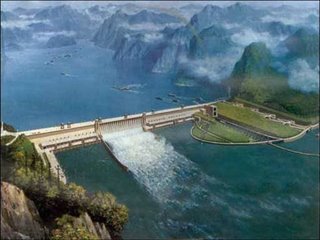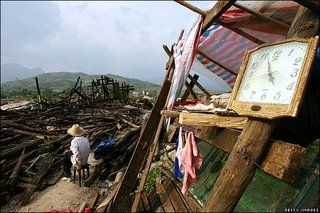Dammed if they do
 The climate change crisis has done more than anything to raise public awareness about the relationships connecting economic development, energy use and environmental quality. If there has been a downside to the public education efforts around global warming, it may be the inadvertent overshadowing of other (equally important) environmental issues that loom on the horizon. Of these, none is more urgent than those surrounding global water quantity and quality.
The climate change crisis has done more than anything to raise public awareness about the relationships connecting economic development, energy use and environmental quality. If there has been a downside to the public education efforts around global warming, it may be the inadvertent overshadowing of other (equally important) environmental issues that loom on the horizon. Of these, none is more urgent than those surrounding global water quantity and quality.A previous post highlighted the water problems in India. A recent Boston Globe article (below) illustrates how China’s exploding economy has finally brought the controversial Three Gorges Dam project – the world’s largest hydroelectric dam -- to fruition. Debates over the costs and benefits of the project continue to boil over. (GW)
Land seizures, corruption decried
CHONGQING, China -- Officials here say the mammoth Three Gorges Dam Project along the historic Yangtze River will control deadly flooding, provide electricity to millions of people, and create vital inland navigation along a 400-mile long reservoir.
But behind the project's promise and grandeur -- the $30 billion endeavor is widely billed as the world's largest construction project -- lie stories of corruption, land seizures, and despair.
According to farmers displaced by the project, local officials routinely violate the rights of the 1.2 million people being moved off their land to make room for the dam's massive reservoir, and firmly suppress stirrings of protest.
Fang De Gui, 41, is a recently unemployed man in Guangtiangou commune in China's central Chongqing province, just west of Hubei, where a large part of the Three Gorges Dam's reservoir will stand. He said the project might have been conceived to enrich and develop China, but has ended by costing his family and friends their land and livelihoods.
The dam's winding reservoir will submerge 13 major cities and more than a thousand villages, and Fang said the small piece of terraced farmland on which his family grew eggplants for the last 22 years was recently appropriated by local authorities to accommodate a new bridge across the Yangtze. But Fang said his family never received any compensation for their loss.
"No one knows what happened to the money we were to get for that," Fang said.
What burns Fang and his family even more is that the roughly built concrete apartments they erected with their own money in the mid-1990s will be taken from them for about $6,000 each, half of their replacement cost.
"It's absurd and we've gone from one official to the next, but no one is interested in helping us," said Fang's wife, Chen Ya Juan, 41.
Zeng Yan Guang, 62, a neighbor and friend of Fang's, nodded in agreement.
"For now I can get by eating what I grow," said Zeng, who illegally farms what was his land by the bank of the Yangtze. "Once my land is under water I've no idea what I'll do to survive."
Most of the other people in the commune have left their quaint old wooden homes set along the area's verdant hills and moved into the drab urban apartment blocks in which Beijing resettles displaced families. But Zeng and a handful of others from Guangtiangou commune are fighting for better compensation and staying put in what is now a ghost town full of half-demolished houses and abandoned fields.
They admit they have little chance of winning. But the manner in which many people adversely affected by the dam accept the upheaval in their lives is emblematic of the perceived social contract in today's China.
While Fang and Zeng complain bitterly about the local officials who they say are responsible for their situation, they say they find no fault with the Three Gorges Project overall. In fact, popular support for the dam is surprisingly common.
"The government took away 1 mu [about 7,000 square feet] of my land that was worth about $12,000 and gave me only $800 for it," said Mao Yuan Xiu, 52, a farmer in Ling Du village in Chongqing, whose land was appropriated to house some people displaced by the Three Gorges Dam. "But I don't mind -- this is my gift to the nation."
To some extent this apparent fraternalism shown by people affected by the government's hard-nosed development style is genuine, said Wu Deng Ming, president of The Green Volunteer League of Chongqing, a local environmental nonprofit organization.
Locals also support the project, which consists of several dams along a 125-mile stretch of the Yangtze River between the Qutang, Wuxia, and Xilin gorges, because planners say it will control the constant flooding of the Great Dragon, as locals call the legendary river, which has killed a million people in the last century alone. And when several of the smaller dams in the project are completed in 2009, 10,000-ton freighters will be able to travel up and down the 400-mile reservoir, giving the remote region's economy access to the rest of the country.
With much of China seized with a genuine passion for nation-building, something that Confucian values say often calls for individuals to sacrifice for the group, Mao and Fang said they don't mind being poorly compensated by the government for their loss of land and business and for the expenses incurred by relocating.
But Wu said part of the reason people short-changed by the authorities put on a brave public face is fear.
The dam "is a very sensitive issue, especially its displacement of people," Wu said. "Those who talk about this can get some bad punishment."
The Three Gorges Dam was first conceived by China's republican leader Sun Yat-sen in 1918 and Mao Zedong revived the idea in the 1950s. But China lacked the capability to implement it at the time. When work on the dam finally commenced in 1993, the Communist Party held up the project as a symbol of its power and prestige. Now anyone criticizing the gigantic endeavor is seen to be challenging the party.
In May, when Fu Xiancai, 47, a farmer in Chongqing, spoke to foreign journalists about the inadequate compensation given to people displaced by the dam, he was assaulted by thugs after being called in to visit the local police station, and beaten so badly he is now paralyzed. A police investigation declared that Fu's injuries were caused when he accidentally fell down a hillside.
Critics say that while the dam is presented as a means to develop China's interior regions, more than 40 percent of its electricity goes to Shanghai and coastal regions.
Most significantly, if the main dam at Yichang, which is in a seismically unstable area, were to break, it would flood one of the most populated areas in the world.
Disturbingly, numerous local news media reports have already been saying cracks are developing in the main dam and that some of the materials used to construct it have been sub-standard. But the government has denied this.
Zhang Xue Qing, 62, a storekeeper near Fang's commune whose family was also displaced by the dam, said the project has deteriorated into a gigantic opportunity for contractors and officials to make money.
Many activists agree, and say that while the Chinese government has made short-changing poorer residents displaced by the dam an essential way of saving costs, the profits being made by cement companies, engineering firms, and other businesses working on the dam are skyrocketing.
"Is this fair? No, but this is China," said an activist in Beijing who asked not to be identified out of fear of reprisal. "The cost of development is not paid by the richest but the poorest."

0 Comments:
Post a Comment
<< Home